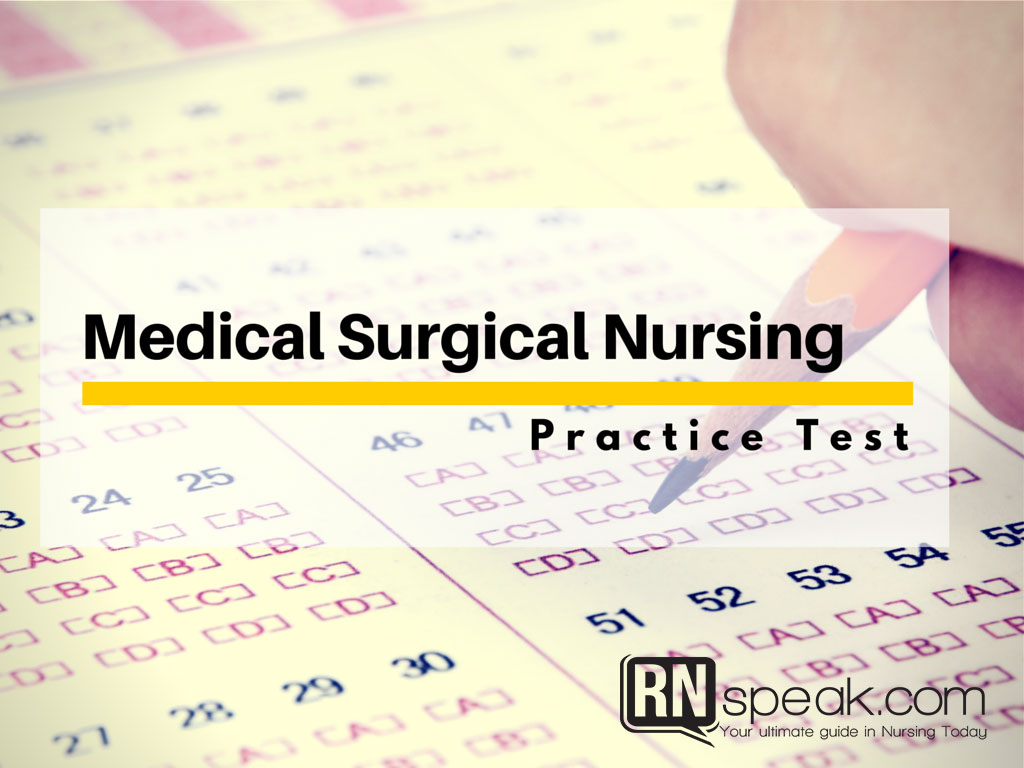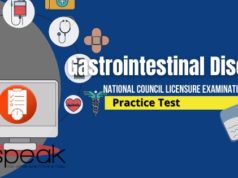This is a comprehensive examination in order to serve as a reviewer for the upcoming Nursing Board Examination for Nurses on July 2012. Read the questions carefully before answering them. Please choose the best answer.
This test covers the following concepts in various forms from easy to difficult questions.
- Pharmacology
- Endocrinology
- Neurology
- Prioritization of Care
Medical-Surgical Review Test Questions
1. What is your nursing consideration when it comes to administering paracetamol, choose the contraindicated?
A. Give after a low-fat meal
B. Give after a high carbohydrate meal
C. Give after a low sodium meal
D. Give after a full diabetic diet
2. A client came into your OPD clinic complaining that his medication Betamethasone is not serving him well. As a nurse, you must further assess if she is
A. Taking it with or without food
B. Taking it with coffee
C. Taking it with orange juice
D. Taking it with caffeine-free tea
3. Bryan is on lithium therapy. Lithium toxicity will likely happen if the patient is taking this drug?
A. NSAIDS
B. Budesonide
C. Salbutamol
D. Penicillin G
4. Dina is having seizure episodes. Her maintenance is phenytoin. Which drug can potentiate its effect?
A. Celecoxib
B. Mefenamic Acid
C. Baclofen
D. Morphine
5. Gout has been a problem with May. Her doctor prescribed Allopurinol in order to reduce uric acid deposits. These are health teachings for her except?
A. Teach her to comply with medications as prescribed.
B. Teach her to avoid alcohol and caffeine
C. Teach her to drink Vitamin C
D. Teach her to drink eight to twelve glasses a day of water
6. May returned with a laboratory result showing her uric acid levels to be 25 mg/dl. Upon assessment, she’s yellowish in appearance. What is the best nursing action?
A. Hold the medication and refer to the physician
B. Continue the medication and refer to the physician
C. Hold the medication and reassure that the yellowish discoloration of the skin is only a side effect
D. Reassure the patient that the medication is in process
7. David wanted to know how he could give eardrops to his father. What is the correct way of administering eardrops to adults?
A. Hold the earlobe up and back
B. Hold the earlobe in a neutral position
C. Hold the earlobe down and back
D. either A and C
8. When a patient is diagnosed to have kidney failure, as a nurse the main goal is to prevent the accumulation of fluids in the body. These are the following health teaching appropriate, except:
A. Teach the patient to eat a low salt diet
B. Teach the patient to measure his intake and output daily
C. Teach the patient to have a high carbohydrate diet with low protein content
D. Teach the patient to have a high carbohydrate diet with a high protein content
9. A wife of your patient approached you one day telling you that her husband has sudden mood swings. He was diagnosed to have acute renal failure. How can you make the wife cope with this situation?
A. Tell her that this is a normal process of having kidney failure and listen to her more
B. Tell her that this will just soon pass away
C. Tell her that she is the one who is having some adjustment and not her husband
D. Tell her that this is not your business, it is a problem that she and her husband will fix it
10. In caring for the patient with elevated BUN and serum creatinine, he will most likely be dehydrated; loss of weight and the skin turgor is poor. What nursing diagnosis describes this best:
A. Skin integrity impairment
B. Alterations in Nutritional requirement
C. Fluid Volume Deficit
D. Risk for Injury
11. Cushing’s syndrome has symptoms of weight gain, buffalo hump, moon face, insomnia, and hirsutism. Upon laboratory examination which of the following may not increase
A. Neutrophils
B. Eosinophils
C. Basophils
D. Lymphocytes
12. Marina is diagnosed to be pre-diabetic. These are risk factors of a pre-diabetic except:
A. Having a first-degree relative with Diabetes Mellitus
B. History of vascular disease
C. Blood pressure of 90/60 mmHg
D. Inactive lifestyle
13. A 56-year-old patient complains of longer wound healing, an increase in thirst, and having a blurred vision. What is an appropriate nursing action?
A. Diagnose him to be a diabetic
B. Request for HbA1C
C. Request for Fasting Blood Sugar
D. Refer to the physician
14. A 65-year-old Diabetic patient would complain of numbness of extremities, as a nurse, you would recognize this as
A. Varicose Veins
B. Hypokalaemia
C. Sprain
D. Neuropathy
15. For a diagnosed diabetic, which of the following therapy should be done annually?
A. Eye Examination
B. Antiplatelet therapy
C. HbA1C testing
D. Self-monitoring of blood glucose
16. In a stroke patient, which diagnostic exam would sensitively determine infarcts?
A. CT Scan
B. MRI
C. Skull X-ray
D. Doppler Studies
17. Which of the following factors is the leading cause of stroke?
A. Eating fatty foods
B. Inactive Lifestyle
C. Smoking
D. Traumatic Brain Injury
18. Using the Hunt-Hess Scale in grading the effect of the Sub-Arachnoid hemorrhage, what is the category of a patient who has a Glasgow Coma Scale of 13-14, with mild motor deficits and confused, somnolent?
A. Grade 1
B. Grade 2
C. Grade 3
D. Grade 4
19. On day 1, what will be your priority nursing diagnosis?
A. Body image disturbance related to pain
B. Acute pain related to physical exertion
C. Fatigue related to physical exertion
D. Impaired physical mobility related to physical exertion
20. On the 3rd day, Renzo returned with additional symptoms: sensory loss and frequent urination. As a nurse, you are expecting that the doctor will ask as an initial diagnostic procedure?
A. CT Scan with contrast
B. X-ray Lumbosacral
C. MRI with gadolinium
D. Urinalysis
21. What would you expect from a patient with Multiple Sclerosis?
A. Recurrent attack of focal neurologic dysfunction
B. Ataxia
C. Neck Flexion
D. Echopraxia
22. All of these factors increase the tendency to aggravate Multiple Sclerosis except:
A. Stress
B. Exercise
C. Cold Weather
D. Warm Weather
23. What type of cells abnormally functions in the case of Multiple Sclerosis?
A. Beta cells
B. T cells
C. Alpha cells
D. Red blood cells
24. According to studies, these are the following causes of Multiple Sclerosis except:
A. Hereditary
B. Traumatic Brain Injury
C. Vitamin D deficiency
D. Viral Infection
25. Which of the following does not belong to the group of nursing priority in caring for a patient with Multiple Sclerosis:
A. Provide a safe environment for the client
B. Provide steps to prevent infecting others
C. Assist the patient in every activity
D. Teach the patient to maximize his or her own capability









Thanks,so greatfull waooo,I really enjoy this.be bless and continue helping us! God will reward.
Why can’t i view the questions??? 🙁